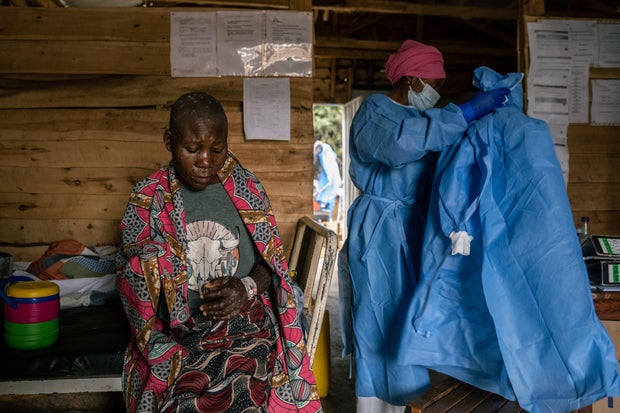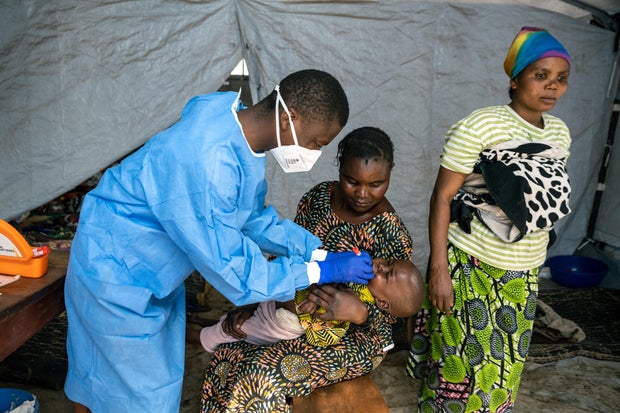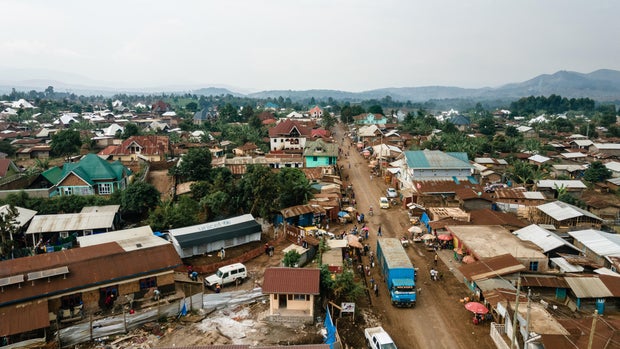Johannesburg — The Democratic Republic of Congo, at the epicenter of a global health emergency declared over a still-growing mpox outbreak, received a first delivery of 99,000 vaccines for the virus Thursday, with a second delivery of 101,000 expected Saturday, the head of the World Health Organization said.
Congolese health officials tell CBS News they hope to start getting the vaccines into the arms of frontline health workers and close contacts of confirmed cases by the beginning of October, with a quicker rollout likely impossible due to logistical challenges.
Officials in Congo say they’ve struggled to diagnose patients and provide basic care in the vast country of 100 million people, where a fragile, under-resourced health care system is also burdened by stigma associated with the virus previously known as monkeypox.
A lack of diagnostic materials and basic medicines to treat the virus, which can improve survival rates, have also hampered efforts to contain the outbreak.
Arlette Bashizi/Bloomberg/Getty
Greg Ramm, Congo country director for the Save the Children charity, told CBS News that mpox cases were still skyrocketing. He lamented what he said was scant attention being paid globally to the crisis, suggesting the world only starts to really take heed when diseases, such as past outbreaks of Ebola, spread beyond Congo’s borders.
A litany of challenges for the mpox vaccination campaign
The first shipment of about 200,000 vaccines, donated by the European Union, will be sent to six targeted provinces. They must be kept continuously at minus-130 degrees Fahrenheit until they are administered, in what’s referred to as cold chain storage — an added challenge for the developing nation.
Dr. Tedros Adhanom Ghebreyesus, director-general of the United Nations’ World Health Organization, said the WHO had “supported the government to get the necessary cold chain in place for the vaccine delivery.”
Congo is a country the size of Western Europe. It is rich with natural resources, including highly sought-after cobalt and copper, and is home to the world’s second largest rainforest. But those resources have been fought over by militant groups for decades and, despite its bounty of natural wealth, the World Bank ranks Congo among the five poorest nations in the world.
The overwhelming majority of the Congolese people have never benefitted from the country’s resources, with roughly 75% of the population living on only about $2 per day or less.
Congo President Felix Tshisekedi has set up a $10 million fund to support the response to the outbreak. Hospitals in the hardest hit areas have reported running out of medicine every day, with officials saying they face challenges even providing sufficient food to patients.
Doctors with several charities working in the country have told CBS News they’re overstretched and short on supplies, even having to use tents and mattresses on the floor of makeshift isolation wards to treat a constant influx of patients.
The desperately needed vaccines are expensive. Health officials tell CBS News that during the 2022 mpox outbreak, manufacturer Bavarian Nordic was selling a single dose of its vaccine for $110.
Jean Kaseya, Director-General of the Africa Centers for Disease Control, has said the continent now needs some 10 million doses to stop the spread of the virus.
“We need to talk about 2 million vaccines to Congo, which is hundreds of thousands of dollars,” said Ramm.
The first few thousand vaccines will be prioritized for health care workers and contacts of known cases, so the initial administration may do little to halt the spread of the virus in Congolese communities.
Mpox can look at first like measles or chickenpox on the skin, with pus-filled lesions and flu-like symptoms. It is a more pressing health concern for those with weaker immune systems, including young children and pregnant women. There are no rapid tests to diagnose mpox, and Congo has only six labs to process the PCR tests, thanks largely to capacity built up during the coronavirus pandemic.
The cost of PCR tests is also largely prohibitive in much of Africa.
Treating the virus requires antibiotics for bacterial infections caused by the lesions, painkillers for fevers and proper nutrition and clean water. These basic needs are a daily challenge at health care sites in Congo.
A deadly outbreak for Congo’s children
Most of the schools in the country, which reopened this week, lack running water, disinfectants and soap – basic items that can help prevent the spread of the virus. More than 600 children have died of mpox this year alone in Congo. Young people are more vulnerable due to other prevalent health issues in the country, including malaria, measles and other childhood diseases.
Arlette Bashizi/Bloomberg/Getty
Mpox was discovered in Denmark in 1958 in research monkeys and named monkeypox. It was first found in humans in 1970 in what was then known as Zaire, now Congo.
Ninety percent of the total mpox cases in the world are in Congo, where people are testing positive for both the newer Clade 1b and the Clade 1a strains. The Clade 1b strain was first detected in the country in September 2023 and has recently been detected in 13 African nations.
More than 655 deaths have been blamed on the virus in Congo, and there are about 20,000 suspected cases.
Health care workers who spoke with CBS News said they fear the real caseload is much larger, as they can only readily access some parts of the country.
Stigma remains a major problem, with communities often looking to traditional healers before turning to Western medicine. Throughout the Ebola outbreaks, it was common for local communities to hide cases of the virus from health care workers, with some claiming the virus only arrived with Western health care workers in their familiar white suits.
Fear of mpox hitting Congo’s cities and IDP camps
The outbreaks have remained fairly isolated to several areas in Congo, but the fear is the virus will hit major cities, such as the densely packed capital Kinshasa, which is home to some 15 million people. The city has seen only a few confirmed cases so far.
Arlette Bashizi/Bloomberg/Getty
There are also camps for internally displaced people in the Eastern Goma region where as many as 1 million people have sought shelter — most of whom have fled fighting among the various militia groups that plague Congo. Efforts to educate the displaced people about mpox are underway, but health care workers tell CBS News it can be difficult to distinguish, at least at first, from other skin diseases that are prevalent in the tent camps due to the lack of hygiene and clean water, such as scabies.
As the rainy season approaches, health care workers worry the IDP camps could be facing a perfect storm, with possible increased mortality from the ever-mutating mpox virus, endemic cholera and possible measles outbreaks coupled with shortages of food, water and medicine and poor basic hygiene.
“This is a forgotten community to the world,” Lindis Hurun, a project coordinator for the Doctors Without Borders charity in Congo told CBS News, adding that most people in the camps were more worried about surviving until the next week than they were about mpox.
Hurun spoke with CBS News after visiting one of the IDP camps, where she had just met a woman who told her she was facing an impossible choice: Stay at the camp with her family in the horrible conditions and face the health risks, or return to their village in the midst of heavy fighting among the militias.




